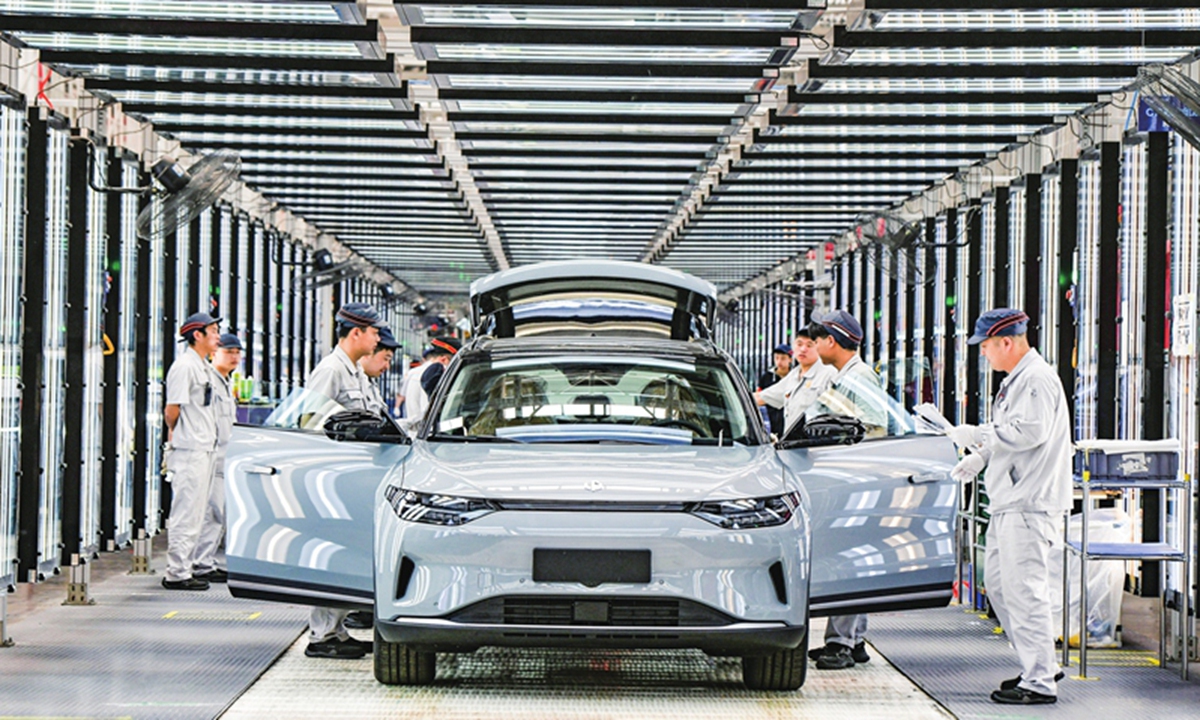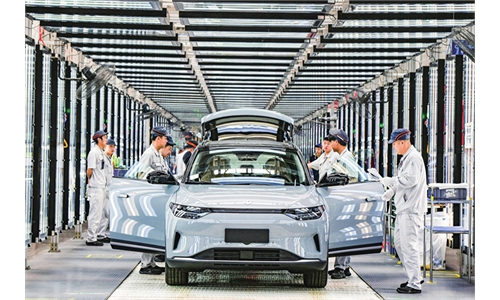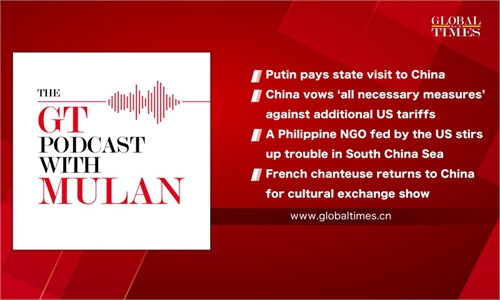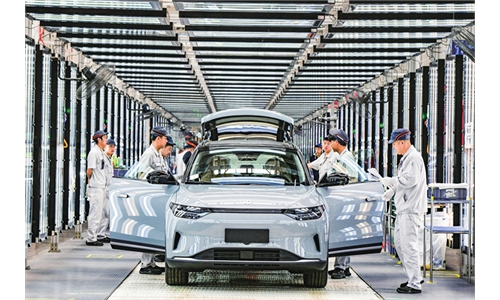Chinese officials vow to step up support for EV sector, slam ‘overcapacity’ fallacy
Remarks show resolve to boost development amid foreign protectionism

Workers complete assembling an electric vehicle (EV) at China's EV start-up Leapmotor in Jinhua, East China's Zhejiang Province on April 1, 2024. The smart EV factory delivered 14,567 new vehicles in March, a yearly increase of 136 percent. Photo: VCG
Officials from multiple Chinese ministries on Monday firmly pushed back against claims by some Western officials and media outlets of overcapacity in China's electric vehicle (EV) sector, while pledging to further step up support for the industry, which has gained global prominence with a considerable competitive edge.
Coming amid protectionist actions taken by the US and the EU against Chinese EVs, latest remarks made by the senior Chinese officials underscored China's unwavering determination to further boost the development of the EV sector and counter foreign protectionism to defend the nation's legitimate rights and interests, experts noted.
During the China Economic Roundtable, an all-media talk platform launched by the Xinhua News Agency, Ding Weishun, an official of the Ministry of Commerce, said that the allegation of "overcapacity" in China is totally baseless.
Equating China's exports of new-energy products to "overcapacity" runs counter to common sense and is seriously inconsistent with objective facts.
Ding noted that if exports mean overcapacity, 80 percent of US-made chips are exported, 50 percent of Japanese cars are sold overseas and nearly 80 percent of Germany's auto output is shipped to foreign markets. In comparison, "China only exports about 12.7 percent of its total EV output," the official said.
At the same roundtable, Huo Fupeng, an official of the National Development and Reform Commission (NDRC), China's top economic planning agency, said that China's EV sector gained a global competitive edge because of multiple factors, including the country's green development strategy, the support of the nation's complete industrial and supply chains, the massive domestic market, as well as an open and innovative ecosystem.
Huo said that the NDRC will work with other government departments to take more concrete measures to improve quality, reduce costs and expand output in the EV sector, so as to solidify and expand the industry's development advantages.
Specifically, various policy measures will be taken to boost consumption of EVs, and support will also be increased to promote technological innovation, the NDRC official said.
He Hailin, an official of the Ministry of Industry and Information Technology (MIIT), said that China's EV industry still has great development opportunities and vast potential.
The MIIT will take proactive measures to create an open, inclusive development environment, which also welcomes enterprises, research institutions and industry groups to cooperate in areas such as trade and investment, research and development and standard-setting, so as to promote high-quality development in the industry.
The latest remarks come as some Western governments take protectionist measures against China's EV industry. Last week, the US government announced a move to hike tariffs on Chinese EVs and other products. The EU launched a so-called anti-subsidy investigation into Chinese EVs.
Both measures have drawn sharp criticism from Chinese officials, who have vowed to take all necessary measures to defend China's legitimate rights and interests.
Zhang Xiaorong, director of the Beijing-based Cutting-Edge Technology Research Institute, said that such protectionist moves are aimed at cracking down on China's EV industry, as Western countries have lagged behind China in terms of EV development.
"However, the 'overcapacity' narrative is completely unfounded, considering the rapidly growing global demand for EVs and other new-energy products. China's EV sector will maintain a fast development pace in the coming years," Zhang told the Global Times on Monday.
According to calculations by the International Energy Agency, global sales of EVs could reach almost 45 million in 2030 and come close to 65 million in 2035, which would far exceed current global capacity.
Data from the China Association of Automobile Manufacturers showed that the nation's new-energy vehicle (NEV) output in the first quarter rose 28.2 percent year-on-year and sales increased by 31.8 percent.
NEV exports hit 307,000 during the period, up 23.8 percent year-on-year, reflecting growing demand from the global market.
Zhang Xiang, director of the Digital Automotive International Cooperation Research Center of the World Digital Economy Forum, said that US and EU politicization of the EV industry to crack down on Chinese EVs will not stop China's EV industry, and will not help their own EV industries.
He said that if China also raises tariffs in response to the US tariff hikes on imported cars in a reciprocal manner, as it did during previous rounds of US additional tariffs, it will have a major impact on US auto imports.
"So, the US measures will also have a negative impact on the US' EV industry, including the US market and its consumers," Zhang Xiang told the Global Times on Monday.




